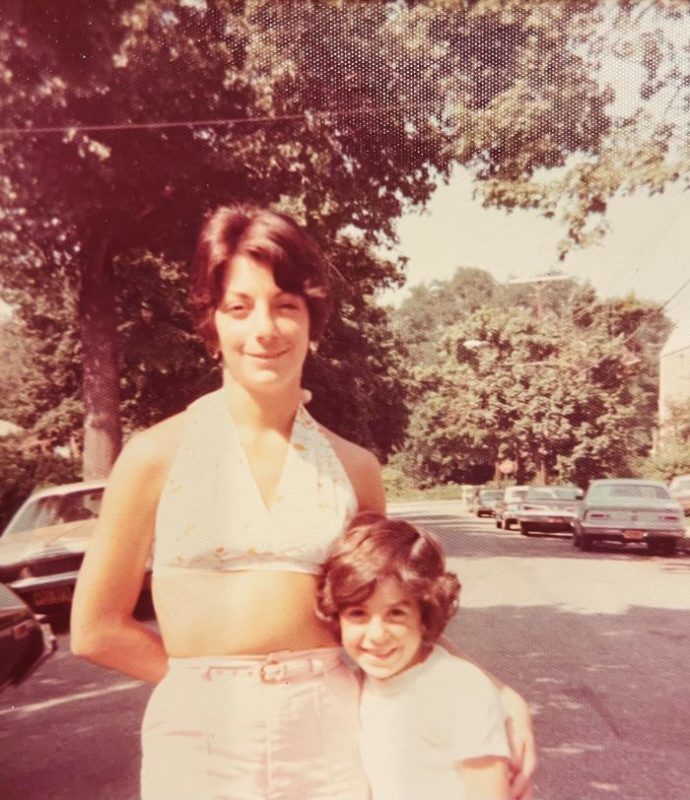By Guest Blogger Diane Olsen
Growing up with a parent with mental illness is just hard. And confusing. And exciting. And exhausting. Growing up with a mother who is bi-polar and narcissistic is difficult. And nerve-wracking. And embarrassing. And soul-crushing. And permanent.
One of my earliest memories of my (biological) mother was when I was 4, listening to Roberta Flack’s “Killing Me Softly,” trapped in the giant leather chair with my mother’s head buried in my lap as she cried and the lyrics underscored her every sob. It was my birthday, and I remember because that same afternoon we baked cupcakes and I wore my favorite dress and pigtails and she sang Happy Birthday as I blew out the candles (there’s even a picture!) I have many of those memories. And what I don’t remember, others don’t mind telling me. Especially the bad stuff. Like that when I was born, my mother was hospitalized for severe depression. They took her away and gave her shock treatments (it was the 70’s after all). That one hurt. A lot.
My mother was one of those people that I would call eccentric. She was incredibly smart (skipped 2 grades in HS and had an outrageous IQ), incredibly artistic (writing poetry and playing piano by ear) and incredibly fun. When she was fun. When she wasn’t, she was simply awful. Prone to severe mood swings, you never knew what the day would bring. One minute, we’re driving to the ocean blasting songs and singing along with the radio, wind in our hair, sun on our faces like a movie scene in Technicolor. The next, we’re being left alone because she won’t get out of bed to get us to school or herself to work. Or she doesn’t come home. Or she does and makes us leave. Or she’s screaming at us that we’ve ruined her life. Or whatever.
 She was pretty and funny and kind and thoughtful. When she was. She had lots of boyfriends (after she and my dad divorced. And probably also while they were married). She had lots of friends. She had lots of problems. She used her children to punish their father. She pitted her children against each other. She embarrassed her children publicly. Everyone thought she was cool. Everyone thought she was crazy. I didn’t know what to think.
She was pretty and funny and kind and thoughtful. When she was. She had lots of boyfriends (after she and my dad divorced. And probably also while they were married). She had lots of friends. She had lots of problems. She used her children to punish their father. She pitted her children against each other. She embarrassed her children publicly. Everyone thought she was cool. Everyone thought she was crazy. I didn’t know what to think.
I remember that saying “When she was good she was very, very good. But when she was bad…” She was my mother.
Too many stories to tell. She was sick. She refused treatment. She was forced into treatment. She was better. She was worse. Lather. Rinse. Repeat.
Recently my mother passed away. Well, it’s actually been almost 3 years now. I didn’t post about it or memorialize her or even have a funeral. It’s taken me that long to try and write about it. She had called me the day before she died, just to say hello. She had suffered a traumatic brain injury later in life which exacerbated the bipolar situation. She would sometimes call me 10 times a day. We were away on spring break, and I figured I’d call her back later. When the call came that she died, I think I was relieved. Which is awful, but true. I was relieved for myself and my family that I wouldn’t have to care for her anymore, or care about her. I was relieved for her, as she was not a happy person and didn’t have a happy life. She was a firm believer in God and Heaven and the power of the ocean, so I felt she might finally be at peace. We might all be at peace. At least that’s what I was thinking when I released her ashes into the ocean.
Funny thing is, she still haunts me. I still find myself crying at things I cannot control. I have quick flashes of the trauma, interspersed with full-on grins. I feel my heart burn with anger, and then swell with love. I’m upset that I still allow myself to feel responsible. But I do. I think I always will feel like the 3-year-old unable to console my mother as she wept in my lap. Weird, right?
I’ve learned a lot about her illness over the years. I can almost understand what she meant when she said she couldn’t take the meds because she couldn’t feel anything on them. And she couldn’t live that way. I know that she didn’t want to feel those feelings, and she didn’t mean to be so angry and hurtful. She always told us she had wanted to be a mother forever, but as a mother myself, I could not, and still cannot, understand why she wouldn’t want to get better. Why she hurt us so. Why she couldn’t see how important it was to us to try. Take the meds. See the Dr. Fight for her sanity and the well- being of her family. Show us we were important to her.
When a mother suffering from mental illness dies, it’s confusing. It’s hard. It’s sad. It’s a relief. It’s a lot of guilt. It’s a lot of work.
I’ve chosen to work through these feeling by focusing on the good stuff she did give me: and insane appreciation for music. All the music! A love of writing and dancing and any form of creative expression. Kindness. Compassion. Empathy. Resilience. Smarts. A great head of hair. The need to be a good mother. To be a good person. And an understanding of mental illness. I’m still working on that one.
Some who have read this have asked me how to wrap it up, can I summarize or somehow provide some closure. The truth is, I can’t. I am working on it, but I can’t wrap it up in pretty paper with a big, bright bow. What I can say is that I have been blessed to have a family who have supported me always, a husband with infinite patience and some wonderful therapists who have helped me to better understand my feelings and how to ease my anxiety and manage my trauma. I can tell you that I am thankful to have been able to use my experiences to develop positive relationships with my own children who know they are loved unconditionally and will never be alone in this world. I would encourage anyone who is suffering from mental illness or dealing with someone who is suffering to seek help. It really does make a difference.
~ For a list of local counselors, therapists and psychologists, visit TMoM’s list here.
~ Want to get notifications on local events and happenings? Subscribe to Triad Moms on Main’s free weekly newsletters here.















I lived your story, and I feel your pain, but rejoice in your strength and desire to both understand and move forward , creating a beautiful life.
Namaste, Diane.
Having known your mom I can relate and all I know is she loved you in her screwed up way, as she loved your sister and all the grandkids. I tried but it was tough. I’m proud of you for writing this and for putting her in the ocean. Her peaceful place. Love you, sue